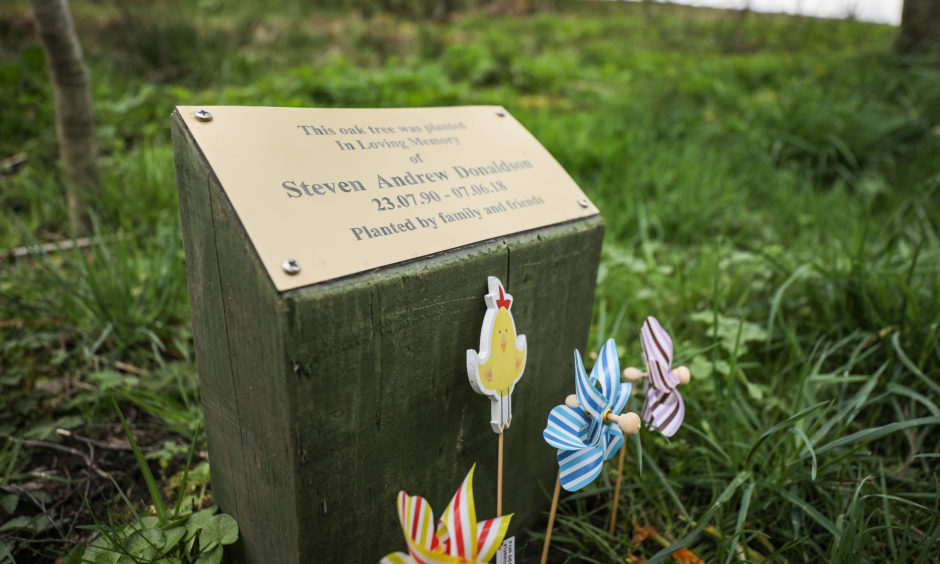Kinnordy killer Tasmin Glass’s “pivotal role” in the brutal death of boyfriend Steven Donaldson justified the “manipulative and devious” young woman’s ten-year culpable homicide sentence, appeal judges have said.
But they have suggested a jury may not have taken the decision to convict her of murder to distinguish the then mum-to-be’s culpability against that of the extreme violence shown by accomplices Steven Dickie and Callum Davidson in the evil slaying of the popular Arbroath oil industry worker.
They also ruled the judge who sat before one of the most horrific trials in Angus criminal history was right to jail murderer Davidson for 24 years in view of the savagery which took the life of his 27-year-old victim and the lack of remorse shown by the “violent and aggressive thug”.
Following an Edinburgh court of criminal appeal rejection last month of early freedom bids by Glass and Davidson, a panel of three senior judges has now issued in writing their reasons for upholding the prison terms laid down by trial judge Lord Pentland in May.
The appeals were heard on the same day 24-year-old Dickie was found dead in his cell at Perth prison, where he was serving 23 years for his part in the murder of Mr Donaldson in June 2018.
Lord Brodie, who heard the appeals with Lord Drummond Young and Lord Turnbull, pointed to Lord Pentland’s appeal report stating the “evidence left no room for doubt” Glass was “intensely involved in the planning and facilitating of the brutal killing of her partner.
“She played a pivotal role in the killing. She was the prime mover behind the assaults on the deceased.
“Without her active encouragement and participation, the attacks could not and would not have occurred.”
The ruling said there had been “ample evidence at trial that the appellant had had sufficient presence of mind to carry on her life as normal in the aftermath of the deceased’s death.
“Although young, the appellant had demonstrated that she had a manipulative and devious personality.”
The appeal finding continued: “Precisely why the jury did not convict the appellant of murder is not of course known but there are a number of possible reasons among which is that they were not satisfied, despite all that should have been foreseeable, that the appellant had the necessary intention to kill or wicked recklessness as to the death of the deceased.
“After all, not every actor who kills his victim in the course of an assault with a bladed weapon is convicted of murder.
“Moreover, the jury, reasonably enough, might have thought that culpable as the appellant was, her culpability fell to be distinguished from the clearly much greater culpability of Dickie and Davidson who had actually inflicted the extreme violence on the deceased in a persistent attack which had only ended with the deceased’s death.
“They may have taken the view that to have convicted all three of murder would have been to lose or blur such a distinction.”
Lord Brodie added: “We cannot regard the sentence imposed, taking it to be the equivalent of something not far short of 11 years detention, as excessive.
“The appellant comes from a good background. She has a supportive family. She has no previous convictions. She has a talent for music. She is the mother of a young child. She is still only 20 years of age.
“Nevertheless, she has been convicted of what the trial judge was fully entitled to describe as a serious offence of culpable homicide. Her sentence must reflect that.”
Davidson, said the ruling, had been sentenced to a term appropriate to the more serious, albeit not the most serious, cases of murder.
“This, in our opinion, was such a case,” added Lord Brodie.
“The trial judge in his sentencing statement described the degree of the appellant’s culpability as at the high end of the spectrum. We see no reason to disagree with that.
“Now it may be that the attack on the deceased was not a long time in the planning; a matter of hours perhaps rather than any longer, but it was undoubtedly premeditated and coordinated.”
Davidson said it was Dickie who was responsible for the barbaric attack at Kinnordy Loch nature reserve in which Mr Donaldson’s spinal cord was severed in two places by a heavy bladed weapon before the victim was dragged under his car and the vehicle set on fire.
Lord Brodie continued: “The appellant has demonstrated no victim empathy or remorse.
“The author of the criminal justice social work report viewed him as displaying a callous disregard for the impact of his actions.
“What can be said is that there is nothing by way of mitigation in the appellant’s attitude to what the jury found him to have done,” the opinion concluded.













